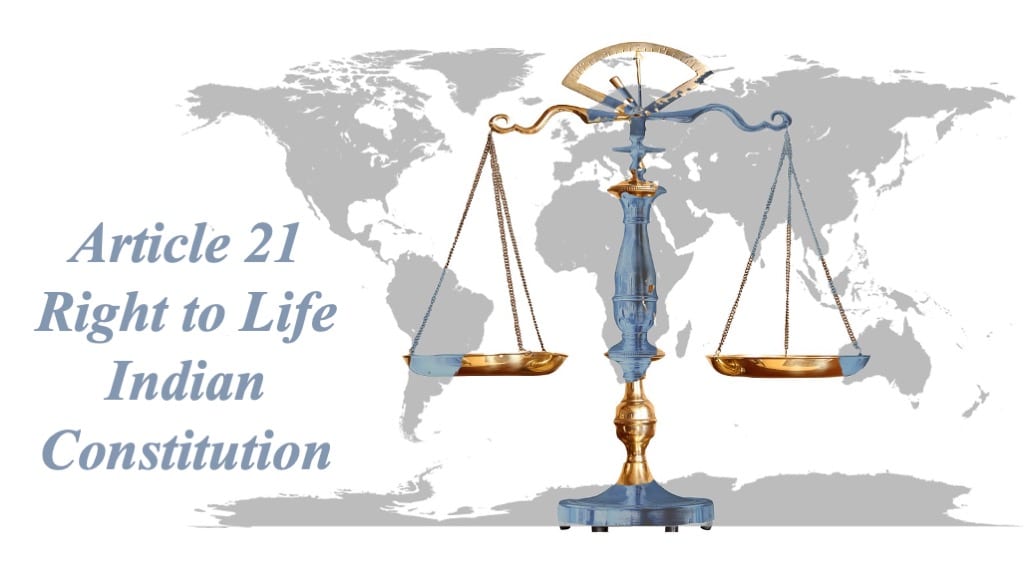
ARTICLE 21 OF INDIAN CONSTITUTION
Among human social ideals, the sacredness of human life is arguably the most fundamental. It is acknowledged in internationally recognized declarations of human rights as well as in all civilized cultures and their legal frameworks. Everyone has the right to live their life as they see fit, free from unjust intervention from others. Only a democracy that upholds the rights of its people to defend their own lives and liberties can be considered successful.
Article 21 of Indian constitution: About
- “No person shall be deprived of his life or personal liberty except according to the procedure established by law,” reads article 21 of Indian constitution.
- The Indian judiciary has construed this provision broadly to encompass a range of aspects of human life that extend beyond physical existence.
- According to rulings by India’s Supreme Court, a person’s right to life article 21 encompasses their ability to live in dignity, their ability to support themselves, their right to a clean environment, their health, and their right to privacy.
Right to life article 21: Scope
The Indian judiciary has construed right to life article 21liberally to encompass not only the right to bodily existence but also the right to a meaningful life. The right to a clean environment, the right to health, the right to privacy, and the right to live with dignity are all included in the right to life and personal liberty, according to the Supreme Court’s ruling.
- The Right to Live with Dignity: According to Article 21, the right to life and personal liberty includes the fundamental right to live with dignity. The Supreme Court ruled that having the freedom from discrimination and harassment, as well as the right to be treated with respect, are essential components of the right to dignity.
- The Right to Livelihood: According to Article 21, the right to subsistence is a necessary part of the right to life. The Supreme Court ruled that a person’s right to a living includes the ability to work and support oneself and that the government cannot deny someone their right to a livelihood without first ensuring that they have received due process.
- The right to life and personal liberty: As guaranteed by Article 21, it includes the right to a clean environment. The Supreme Court has ruled that in order to enjoy other fundamental rights, such as the right to life and the right to health, one must have access to a healthy environment.
- The Right to Health: According to Article 21, everyone has the fundamental right to good health. As per the Supreme Court’s ruling, the government is obligated to furnish its citizens with sufficient medical facilities, and the entitlement to health encompasses the right to obtain medical care as well as the right to a healthy environment.
- The Right to Privacy: According to Article 21, the right to privacy is a basic right. According to rulings of the Supreme Court, a person’s right to privacy encompasses the freedom to live an unhindered life, the right to manage how their personal information is utilized, as well as the right to privacy.
article 21 of indian constitution: Case Laws
- In the case of Sunil Batra v Delhi Administration, the Supreme Court stated that one’s “right to life” encompassed the freedom to live a healthy life and take advantage of all of the body’s natural capabilities. It would even cover the right to defend one’s customs, traditions, culture, and everything else that gives one’s life significance. It also includes the right to rest and health as well as the freedom to live and sleep in peace.
- In the case of Chandra Raja Kumar v Police Commissioner Hyderabad, it has been ruled that the right to human dignity and decency is a part of the right to life. Thus, holding beauty pageants is offensive to women’s dignity and decency and violates Article 21 of the Constitution only when it is egregiously vulgar, lurid, obscene, or meant as a means of extortion. Thus, in accordance with Section 3 of the Andhra Pradesh undesirable Performances Prohibition Act, 1956, the government is able to forbid the competition as an undesirable performance.
- In the case of Navtej Singh Johar v Union of India, applying the principle of human dignity, the court found that Section 377 violated Articles 14, 15, 19, and 21 of the Constitution insofar as it made private, consenting sexual actions by adults, that is, those over the age of 18 who are capable of giving consent, criminal. As a result, it was decided that adult LGBT couples who had sexual relations with each other with their free consent might legally do so.
The scope of the right to life and personal liberty is broad and will only expand in the future. The different facets of an individual’s life that they have the right to manage and can thus improve, as awareness of these parts of their rights to control has grown. The Supreme Court has referred to this Right as the “heart and soul” of the Indian Constitution, and it certainly lives up to that description, it stands for the most fundamental needs of human life.
For any latest news, legal topics, judiciary exams notifications, patterns, etc watch Jyoti Judiciary’s YouTube channel for legal videos for any updates at https://youtube.com/@jyotijudiciarycoaching4852?si=2cwubh9d2A9urwJf



